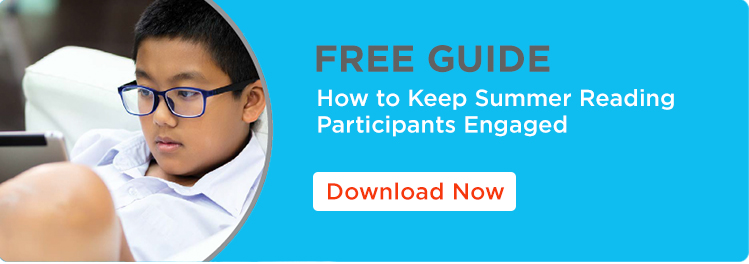
31 Ways to Expand Your Summer Reading Program Beyond Just Reading Books
Many summer reading programs combat summer slide by offering free and fun encouragement to read while school is out. But why stop at reading? Since literacy encompasses more than simply reading books, many libraries are transitioning to summer learning programs that integrate new types of programming, makerspace activities, STEM resources and more into their summer programs.
Transitioning from a summer reading program to a summer learning program can be beneficial to not only school-age patrons but community members of all ages. Learning programs can give patrons new ways to pursue interests and develop new skills and can draw an even wider audience than reading programs alone. By providing access to learning activities of all types, libraries can help prevent summer slide across more sections of their communities and give new and underserved audiences more reasons to visit the library.
The options are endless; your library can encourage literacy and learning through any activity that prompts patrons to use their imaginations, expand their knowledge or communicate what they’ve learned. Read on for a list of diverse activities — from cooking to experimenting to inventing — to help you get the wheels turning for your own summer learning program.
Cooking
Cooking involves lots of literacy-based activities, including reading recipes, measuring ingredients, checking temperatures and even solving chemistry problems. Some cooking-focused prompts for your summer learning program include:
- Invent a recipe for a food or drink. Write the recipe down, then make it and share it with a friend or family member.
- Find a cookbook in the library, and make the most interesting dish that’s inside.
- Play food boggle. Choose your favorite summer food — e.g., “ice cream” — and use the letters in that word to see how many other words you can make. Bonus points if you can spell out other foods!
Traveling
Many families travel during the summer months, but you can still keep them engaged while they’re away! Even kids who won’t be traveling during the summer can get in on the fun by going on imaginary journeys. Some travel-based literacy prompts include:
- If you are going on a family vacation, read about your destination, and mark your route on a map.
- Pretend you are going on a trip with a friend or relative. Write to the tourist bureau, search online or look at travel guides for more information. Then, plan an imaginary itinerary.
- Learn about an important news event from a place you are going or would like to go this summer. Talk about what you learned with a friend, family member or librarian.
- When you’re out and about around town, keep an eye out for out-of-state license plates, and make a list of all the state names and slogans that you see. Which states did you not see? Which license plates and slogans were your favorites?
Exploring the Great Outdoors
With school out and daylight lasting longer than ever, kids of all ages have the opportunity to spend more time outside. Whether your library serves an urban or rural community, encourage kids to investigate their surroundings with these prompts:
- Take a walk, and draw or write about the things you see that show summer has arrived.
- Pick a flower, fern, leaf or other plant and press it between the pages of a heavy book until the end of summer.
- Plan a backyard camping trip with a friend. Be sure to make a list of all the things you’ll need for your overnight adventure.
- Collect shells at the beach, rocks along a trail or anything else you find in nature. Use a nature guide to identify your items.
- Look for shapes and designs in the clouds, and draw what you see.
- Observe the night sky. Use a star guide to help you find constellations.
- Mark on your calendar some astronomical events for the summer, such as when the sun rises and/or sets or the phases of the moon. Keep track of when you observe these events happening.
Creating New Things
Design-based activities are a great way to keep reluctant readers engaged. There are lots of creative activities you could offer that spur critical thinking and learning, including:
- Invent a tool to help you do a chore more easily. Draw a picture of it, or make it from things you find around your house.
- Walk around your neighborhood and observe the houses around you. Then, design your “dream” house based on your favorite parts of all of the houses you see.
- Design your own board game and write the rules. Bonus points if you make it and play with a friend!
- Start a summer scrapbook or journal. Keep track of the adventures you have throughout the season.
Getting to Know Your Community
Activities based within your own community help participants stay engaged with their surroundings, and they also offer your library the opportunity to forge new partnerships with other organizations. Consider offering patrons opportunities to:
- Participate in library programming outside of the library. Encourage patrons to attend events offered by the library and its partners, which can include parks and recreation departments, community centers or local schools. (This provides your library with the opportunity to reach families in the places where they’re already spending their time.)
- Explore new places or meet new people within your community by attending social events, open houses for businesses, and so on.
- Ask employees at local businesses and reading program sponsors for recommendations of books to read. Once patrons collect recommendations, have them share their reading log with a note about who recommended each book.
- Complete a trivia sheet that revolves around a local museum’s collections. (Your library can drive engagement by arranging for free or reduced admission for your participants so they can experience the collection firsthand as well.)
Fostering STEM Skills
Summer slide can impact all areas of learning, including science and math. Drive exploration of STEM by inviting patrons to:
- Participate in weekly STEM challenges in the library, such as seeing how high they can build a tower with toothpicks and mini marshmallows. (Provide take-home sheets describing the activity so participants can try it at home with their families as well.)
- Explore the library’s makerspaces, media labs and other technology resources by completing projects linked to an overall theme and learning goals.
- Finish a weekly set of math questions to win a small prize.
- Expand their career horizons by learning more about STEM careers and what they’ll need to do to work toward them.
Getting Social
Summer might mean time away from friends for kids, but it also provides the opportunity to reach out to old or distant friends, or even make new ones — maybe in the library! Encourage literacy and social interaction with these prompts:
- Make a personal phone book with contact information for all of your family members and friends.
- Design your own stationery or postcard and write a letter to a friend, family member or your favorite author.
- Invent a code, and send a message written in code (along with the key) to a friend.
- Post a photo of your favorite place to read, or your favorite friend, pet or plant to read to. Use the library’s hashtag, and tag the library’s Facebook, Twitter or Instagram handles in your post.
- Attend a library event, “check in” at the library on social media and post an image of the event.
Tracking With Wandoo Reader
Regardless of which activities you choose to offer, you’ll need a way to track the activities that patrons complete. Wandoo Reader, Demco Software’s reading program management software solution, provides one of the easiest ways for patrons to track these activities with its Challenge feature, which allows libraries to easily facilitate and manage challenge activities. Challenges are a great way to incentivize behaviors your library wants to encourage, and the gamelike experience offered by Wandoo Reader keeps learners coming back for more. Download our free guide, “How to Keep Summer Reading Program Participants Engaged,” to learn more about how your library can leverage Challenges to increase engagement.




